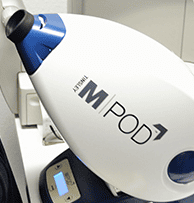Many scientific studies on age-related macular degeneration (AMD) have shown that patients with high levels of lutein and zeaxanthin vitamins have a lower risk of developing the disease as they age. Foods that contain these essential vitamins include kale, spinach, corn, broccoli, oranges, and eggs.
These important vitamins are concentrated in the retina and absorb damaging, high-energy blue light. They essentially function as “internal sunglasses” and prevent the type of damage that can lead to macular degeneration.
Today, ophthalmologists have a way to measure the levels of lutein and zeaxanthin in a patient’s retina. This measuring device is called the MPOD (Macular Pigment Optical Density) and is a non-invasive, simple exam. After reviewing these measurements from the MPOD, an ophthalmologist can recommend a change in supplementation to reduce the risk of macular degeneration progressing.
Ophthalmologist Thomas Henderson, M.D. explains, “In using this device over the last two years, I have learned that each patient reacts differently to supplementation. This testing allows me to know for each patient that the small amount of money spent on a particular supplement is doing its job of reducing the possibility of big expenses later treating advanced macular degeneration.”
People with a family history of age-related macular degeneration are at a higher risk. If you are over the age of 50 and have a family member who has or had the disease, ask your ophthalmologist about an MPOD exam today.

